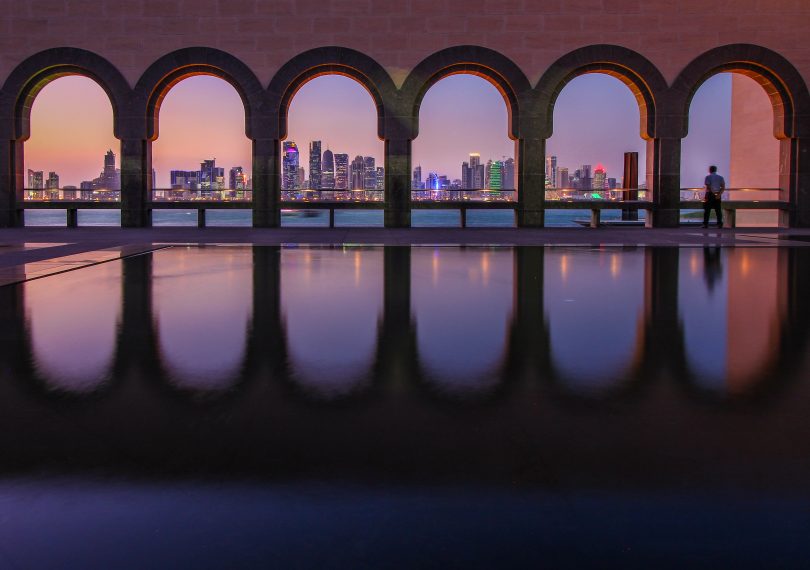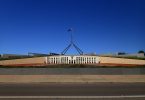Many journalists rationalise their work as members of the ‘Fourth Estate’ fostering healthy democracy. But when democracy is put aside, is journalism still journalism?
Reporters around the world can testify to the important role they play outside the realms of liberal democracies.
Even in 1998, an international study entitled The Global Journalist – News People Around the World found that Chinese reporters considered themselves as watchdogs more so than their Canadian and French counterparts.
The media landscape has changed drastically in the intervening decades, but the determination of journalists in autocratic countries has not.
In fact, reporters working outside of the liberal democratic tradition offer new ways of doing journalism that could be beneficial to Australian press.
Watchdogs in Doha
Through the eyes of Western liberal democracies, the Middle East is infamous for its dictatorships and oppressive regimes. Yet the region cannot be assumed homogenous and it is from inside the small state of Qatar where the media network Al Jazeera has been allowed to flourish.
Al Jazeera broadcasts news on television as well as via the internet. In Australia, it is mostly known through its English-language branch, Al Jazeera English.
In Al Jazeera and the Global Media Landscape, Tine Ustand Figenschou argues that Al Jazeera’s bottom-up grassroots approach to journalism meant that the network was perfectly primed to provide some of the best coverage of the Arab Spring – the series of political uprisings that rocked the Maghreb and Middle East in 2011.
Al Jazeera has actively reversed the usual West to East dynamic of news transmission and instead communicates the stories of the Global South to the Global North.
The network is acutely aware that many of today’s modern democracies were yesterday’s colonisers. There is certainly a postcolonial slant to Al Jazeera’s topics of choice, whether it be a story on the end of America as an empire or the colonial France’s use of obscene names to oppress Algerians.
Yet Al Jazeera’s bold reporting has landed the network in hot water on more than one occasion.
Unlike Australian news outlets, Al Jazeera is unflinching in its stance on the Israeli-Palestinian conflict, earning it few friends in Tel Aviv.
The Iraqi government expelled Al Jazeera from the country in 2013, supposedly due to “sectarian bias” and favouring the Iraqi protesters.
And while Al Jazeera is critical of neighbouring autocratic regimes, it is relatively silent on Qatari internal affairs.
Figenschou explains that Al Jazeera has always received funding from the Qatari monarchy and – given that the network’s commercial revenue would only cover 15-20% of its budget – it is safe to assume this funding is a significant amount.
This financial support provides a good reason as to why Al Jazeera is reluctant to turn its gaze towards Doha.
Despite this political tension, Al Jazeera is still considered a strong media player alongside the likes of BBC and CNN.
An academic journal article from 2016, ‘Al Jazeera in Australia’, found that Al Jazeera English had risen it popularity in Australia after the 2011 Arab Spring and the 2014 imprisonment of Australian journalist Peter Greste.
Avoiding the superiority complex
Nonetheless, the premise of asking whether journalism can be conducted outside of the liberal democratic tradition also relies on the assumption of the superiority of that tradition.
But it would be more useful to regard it as simply a different way of doing journalism.
“Language is never innocent,” declared Roland Barthes. And neither, by extension, is journalistic practice.

BBC News: Coronavirus Outbreak
Whether they realise it or not, reporters in the Australian press hold a lot of power in their hands.
The decisions over what makes news headlines, who to put on a panel, and the questions to include in the next opinion poll, all contribute to determining which issues the Australian public consider as important.
Reporters are not simply empty vessels that communicate ‘reality’ to the masses.
In their book Reactionary Democracy: How Racism and the Populist Far Right Became Mainstream, Aurelien Mondon and Aaron Winter caution against assuming that journalists act in this neutral way, particularly while liberal democracies are caught up in a frenzy over ‘fake news’.
There is some irony that this slippery and potentially unhelpful concept [‘fake news’] was originally popularized by the mainstream press, as if their status was undeniably that of purveyors of real news.
Obviously, we do not claim that the mainstream press peddles lies, and we would certainly not want to equate more serious news sources with straightforward propaganda outlets such as Breitbart, but it is again naïve to assume that there is any such thing as straightforwardly ‘real’ news.
This observation also serves to remind journalists, regardless of whether they operate in liberal democracies or autocracies, must grapple with the power they can wield. These challenges are all the more reason why reporters from all countries and traditions have much they can learn from one another.
Feature image: Skyline of Doha, Qatar




Al Jazeera certainly makes its mark on the world. Fascinating that it is funded by Qatar. I sometimes wonder what prompted that decision.
Hi
I am a bit confused as I thought Journalism students where writing this and wanted feedback but seems it is their teacher.
As someone who has a Journalism degree and also nursing and health promotion qualifications and experience think it is always good for journalism not to be too righteous and never believe you are as objective as you are taught.
Look at the Canberra Press Gallery men and their support of questionable white, middle aged male, pale politicians. Seems they are all in it together and busy covering up for each other.
Tell all the truth and forget about private lives or else we get flawed journalist covering up for flawed politicians like Barnaby Hoyce living in sin while a devote Catholic and lecturing others in abortion and family values.
😆
Donna Byrne
Are there any private or government funded news sources in the West which are considered to have bias toward their government, or is it something more common in the Middle East and Asia?
Emma, thank you for an engaging and informative read. I am surprised and puzzled by Al-Jazeera’s funding (and lack of transparency around it).
That Barthes quotation and the way you applied it to journalism are delightfully chewy – will be thinking about the impact of language and its non-neutrality every time I take to the keyboard.
Nice article!
Maybe it’s easier to tell watchdog and lapdog journalism apart in non-democratic countries.
That Mondon and Winter quote seems quite mild in its criticism of mainstream media compared to say, Herman and Chomsky’s Propaganda Model.
It doesn’t sit well with me that the Qatari monarchy provides most of the funding for Al Jazeera. I still, however, think the quality of journalism from Al Jazeera is on par with its Western counterparts, e.g. the BBC, CNN, the ABC. What Al Jazeera has shown over the years is that decent journalism can be produced outside of Western liberal democracies.
Al Jazeera does achieve what Western media outlets either don’t or choose to ignore: provide insightful and important reports about what’s happening in developing nations and Eastern countries. It also gives us a different perspective on Western society.
Thanks for your article Emma!
I confess that I knew very little of AJ before reading your piece and hearing your talk on the topic. A fascinating insight into global news organisations and the power they hold in our everyday.
Your big, bold quote was a great one to include in this piece, too. A cheeky jab at journalism as a whole, but also good mulling content for future journalists.
Just checking – are you a journalism student or teacher? Thanks!
Hey Emma, excellent article! I agree with what Sam mentioned about it being easier to tell watchdog and lapdog journalism apart in non-democratic countries — certainly the case for me with Singapore. There, it’s abundantly clear which publications are funded by the government and which aren’t.
Typically, the former will be more right-leaning (or they’ll attempt to disregard political stance as much as possible) and the latter, more left, at times getting in trouble with the government as well.